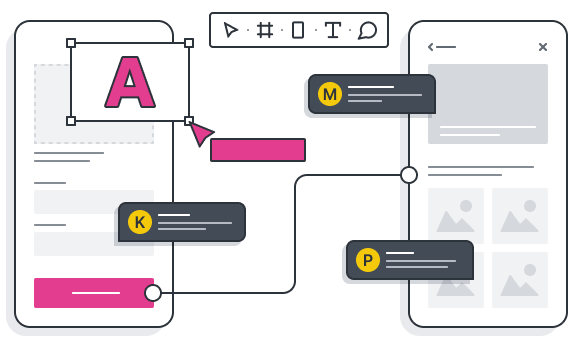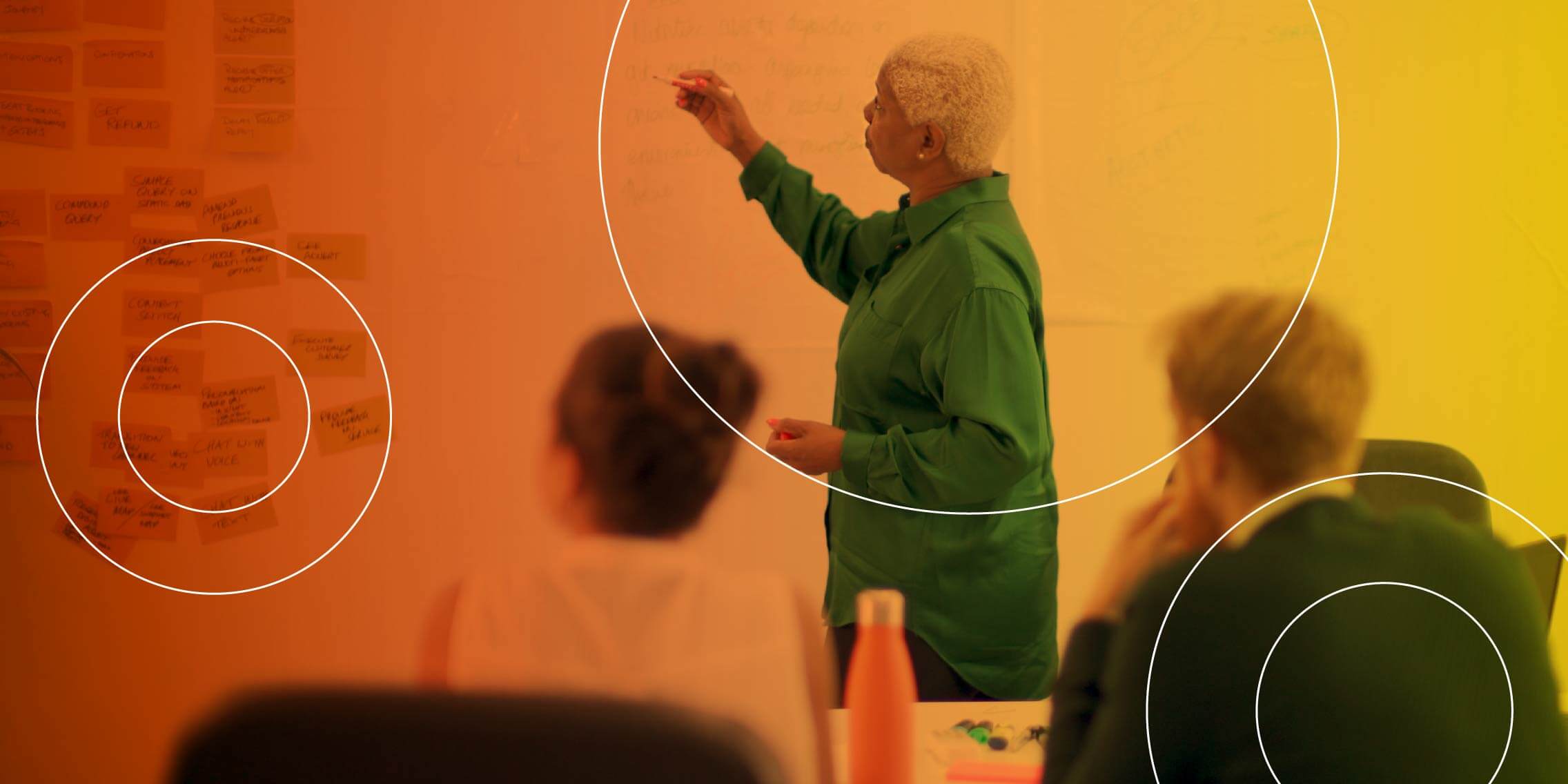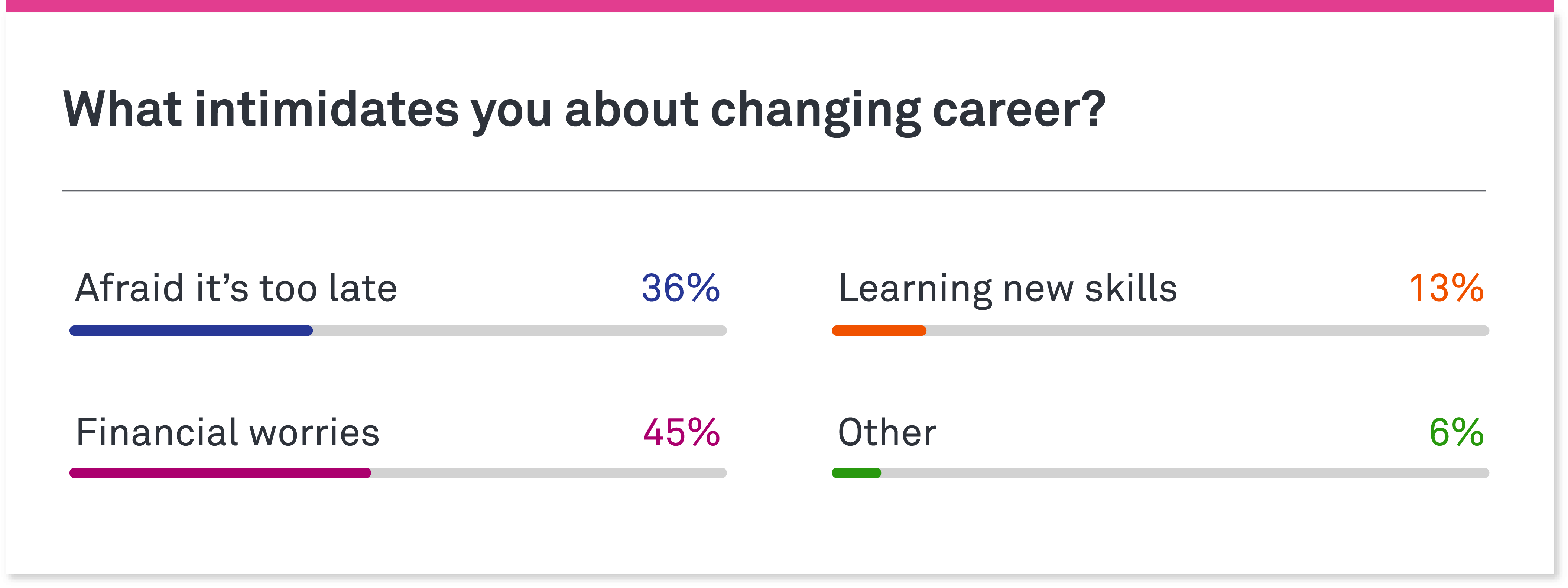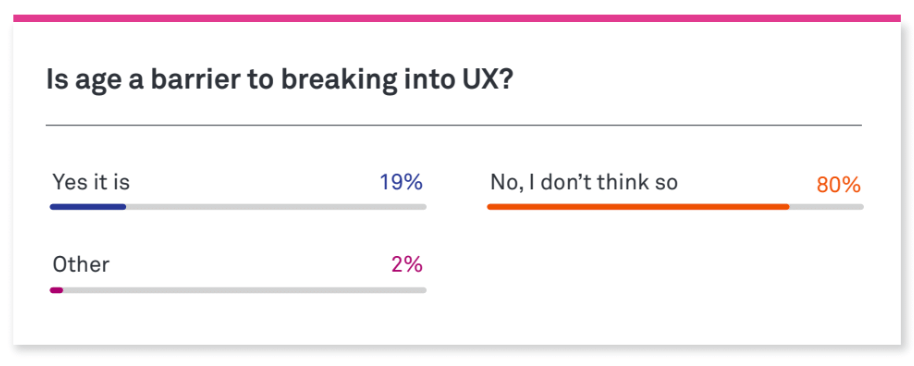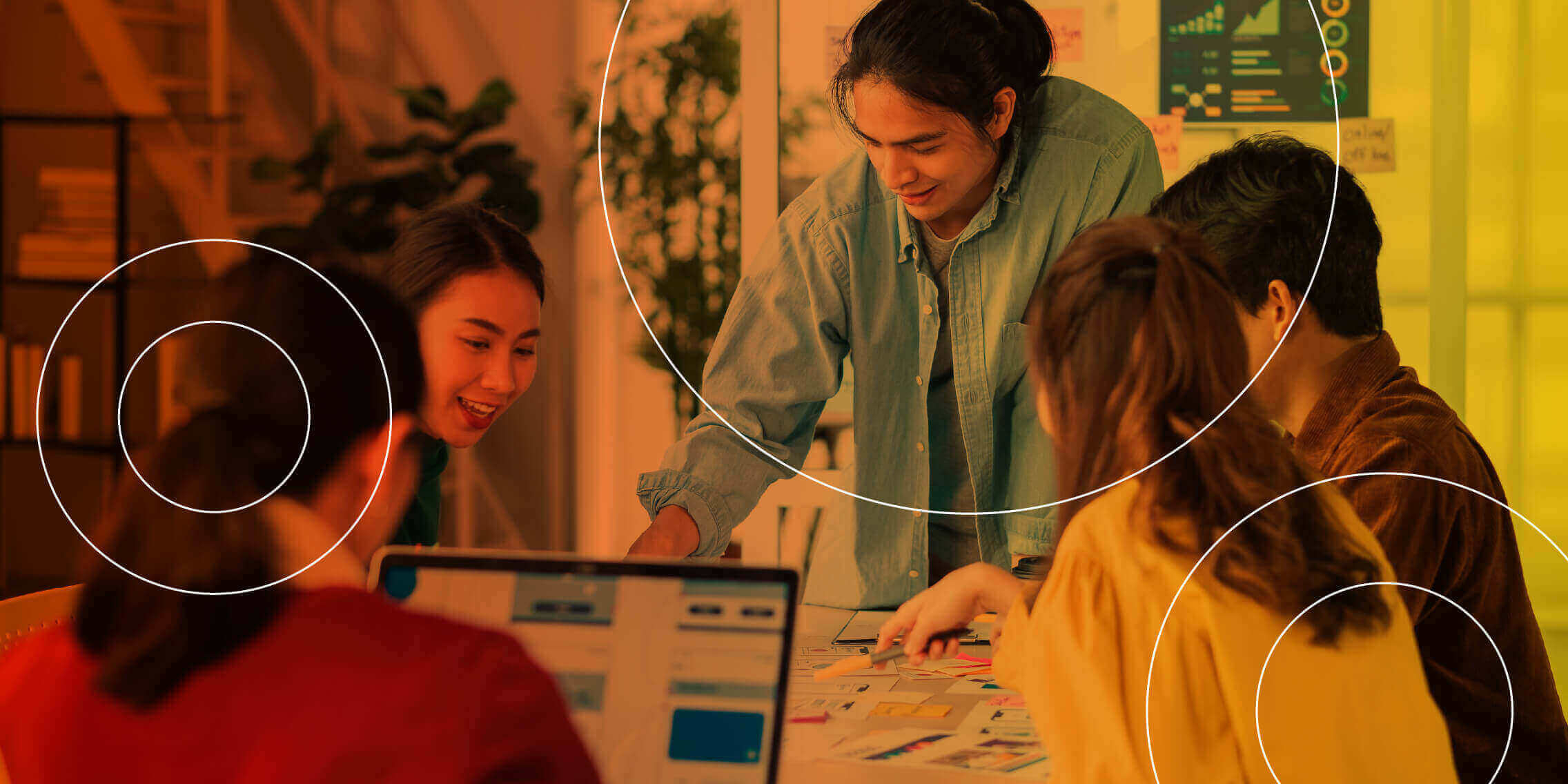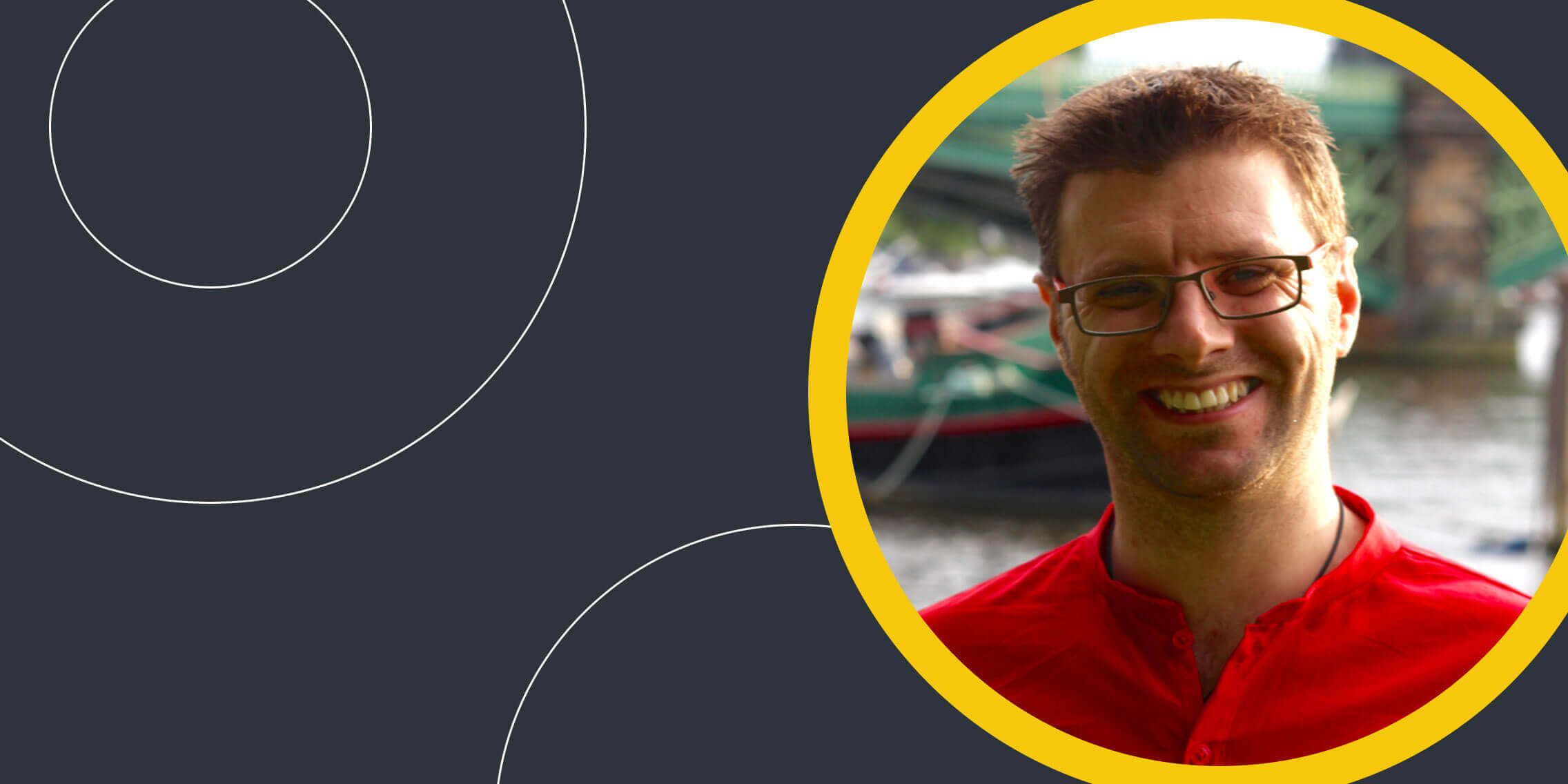There are many reasons to switch career.
You might feel unfulfilled in your current role, you might crave a more creative challenge or you might even worry that increased technology will soon make your role obsolete.
There are also many reasons to feel intimidated by making a mid-career switch, reasons which become increasingly apparent the older you are. A recent poll of our social community revealed that “financial worries” and a fear “it’s too late” are what intimidate people most about making the move.
As with most big life decisions, a career change requires careful consideration. When you’re deciding which role to undertake, you need to ask yourself:
- Is the role in-demand?
- Will it provide rewarding, challenging work?
- Are my skills aligned with what’s required of the role?
- Will there be room for growth?
- Can I apply my experience from previous positions?
For many, UX is an industry that fulfils all of the above. It’s a thriving industry yet to peak and it offers lasting and meaningful work. We asked four alumni to share their experience of making a mid-career switch to UX.
Here’s their top advice for those considering a move to UX in their 40s.

“I was a self-taught graphic designer but it could be difficult to get work. I decided to do a degree in multimedia which set me up to get a job as a web developer at Swansea University. With my design background, I was really interested in UX and felt there was more I could be doing in my job. I worked for 10 years before making the move to UX.
I did the Professional Diploma in UX Design to validate some of the knowledge from my degree. I wanted to build confidence in what I was talking about; to have the best practices and the proper process behind me to do these projects properly. And to be able to justify decisions to stakeholders.”
Was it difficult returning to education?
“Time management could be hard. There were some nights that I was up to midnight when the kids had gone to bed, just to get it done. But I’m lucky in the sense that it was something I’m really passionate about. I wanted to invest the time because it’s something I’m so interested in.”
What advice would you give someone pursuing UX later in their career?
“I would say go for it, it’s an exciting thing to do. If you can find something you’re passionate about, that’s really worthwhile. UX is a really rewarding career because you’re doing something that will make a difference to someone’s life.
I couldn’t have stayed in the post office because I felt like I wasn’t making any impact. I needed to feel like I was progressing in a career and feel challenged.
UX is a good career to transition into later on because age adds to your confidence in approaching problems and dealing with people.
Being an older person you’re also more empathetic and able to see things more from different perspectives. Your life experience means you think more about ‘why would I want to use this?’ Being able to sit back and study things a little bit deeper also comes with age. In my experience you’re more willing to be challenged and be wrong and not see everything as a competition.”
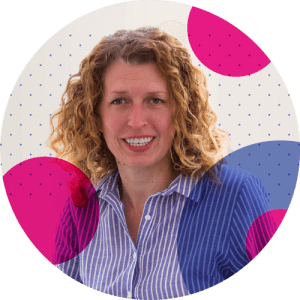
“I felt like I had some UX experience from my previous role but I had no official UX job title. I had been looking at UX jobs online and so much of it was off-putting because it sounded like you needed a million things.
I thought this course would help me get recognised as somebody with a certain level of skill in UX and differentiate me from other people applying for jobs. And it did. Before starting my current UX role, I’d taken a long time to reflect on my career to date, to pinpoint what I enjoyed the most and which of the UX processes I was really good at.
I wanted variety in the role and I also needed flexibility to work around my family.
How did you find the level of support during your studies?
It was great, I think you have to approach an online course with a mindset that you get out what you put in. You have to be self-motivated. The course manager was brilliant! She was always very responsive to any queries however big or small they were. If things had gone quiet for a while, she would check in with emails just to remind you and to give you a nudge.
We were trained by real people who were doing this for a living and truly understood the position that we, as students, all wanted to be in.
I found James, the mentor, to be really helpful whenever I emailed stuff over for feedback. There was always a response which I really appreciated. I really felt supported especially considering it was an online course with students from all different time zones.
What advice would you give to someone considering upskilling in UX?
I would tell them to go for it.
Changing career direction feels like a risky and selfish thing to do mid-life when you’re surrounded by responsibilities. Redundancy gave me the push to do it, but it’s never too late to re-think your skill set and interests.
There are always transferable skills from your previous career and soft skills from general life experience are incredibly useful in UX.

“As I got older, I knew I wouldn’t be working in graphic design for the rest of my career. Everything is on the web now, so if you want to continue working in communications or advertising, you have to come around to digital. The team I work with is evolving all the time and we need to have the most up-to-date knowledge in-house.”
Upskilling is a must if you want to stay relevant in a field. You just have to do it!
What advice would you give someone pursuing UX later in their career?
“Don’t be afraid of UX, it’s an exciting thing to learn! It’s especially interesting if you enjoy problem-solving. You’ve also got bigger chances to get a job in UX because it’s an in-demand field. There’s a high demand for UX designers, it’s a very relevant career now.
If you come from a career that has nothing to do with UX but you’re interested in learning about user behaviour and consider yourself a “people person”, you should go for it!
Don’t put yourself under pressure to finish the course in six months because not everybody is the same. Take the time that you need. It’s not always easy.
What’s your favourite thing about working in UX?
“Talking to people in interviews. It’s so interesting to hear different points of view, the way people think and how they can react so differently to the same thing. It has been an eye-opener for me. I used to be so sure that things should work in a certain way, but it’s not until you hear what the users’ say that you realise that you were totally wrong. You have to stop thinking you’re the user and focus on the people who are using the product.”
While working in marketing, Simon became interested in UX and wanted to learn more about what influenced user behaviour.
“I did a degree in marketing 20 years ago and the roles I worked in after graduating dealt with managing websites. I’d always been really interested in the human element and how psychology plays a role, so I tried to incorporate some of that into my job. But I always had a problem with stakeholder management.
I enrolled in the Professional Diploma in UX Design because I thought I needed more of a qualification behind me. I wanted that extra weight that gave me more authority when speaking about users and user experience methodologies.
I wanted the qualification and the knowledge but without having to do a three year course.
What was the biggest challenge of the course?
Probably the test at the end, I hadn’t done a test in 20 years. I think that was the only thing I was nervous about. I did it at my own pace but there’s always a bit of anxiety before a test.
Staying motivated can be a challenge but it helps if you’re really interested in the subject. I’ve done courses in the past, management courses that have been really dull. You lose interest. The UX course wasn’t like that because I already had a huge interest in human behaviour. I could also bring some of the transferable skills from working in marketing which helped.
Was there any advantage to moving to UX later in your career?
The older you are, the more life experience you have. You’re more open to alternative views. That’s where I think UX is a good transition because you have to be open to different pain points.
You can be a bit narrow minded about life and what life’s about when you’re younger. You get a bit more laid back with age. That’s why the transition is quite good. You’re more confident.
And you’re just more comfortable with human interaction. I’m not saying younger people can’t do that but you’re a bit more at ease when you’re older and that’s an advantage.
I really think you can do UX at any age.
Jade Grainger, Careers Advisor at UX Design Institute, says that age should not be a barrier when it comes to breaking into the industry.
She also had advice for those looking to switch careers, later in life.
Realise the value of your previous roles
“If you’re coming to UX later in life you will have more transferable skills to bring to add to your skillset. Project managers have that holistic approach and those management skills. You’re not starting from zero – there’ll always be transferable skills. UX is about the user, so there’s a lot of people skills. You don’t have to come from a product, marketing or design background. So many people are using UX or UX principles in their roles without even realising it.”
Stay motivated
“It’s not easy to get a job, people who are older have different priorities; they may need healthcare or flexitime and may need to be pickier about roles. That’s why motivation is so important. It’s not easy but you need to be proactive. Find that time and that balance. Try to develop a routine where you can carve out time. Also, don’t be afraid to ask for help whether it’s with childcare or mentoring.”
Stay on top of your technology
“A lot of older career-switchers worry about keeping up with the technology. They fear they’ll be at a disadvantage. But younger professionals aren’t necessarily more tech-savvy, they just have more everyday use. They practice more so they’re more comfortable with it. The truth is that tech evolves at such a rate that everyone needs to be upskilling and keeping on top of the latest releases or updates regardless of age.”
Network, network, network
“Use your existing network. Even if your background is completely unrelated to design, don’t disregard it. There may be opportunities to connect with people who can help you in your career. The older you are, the more people you’ll have in your network from previous colleagues to family connections. People love to share their insights so don’t be afraid to engage with them and ask questions.”
